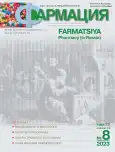Quantitative characteristics of the labor potential of students enrolled in pharmaceutical education programs
- Authors: Gritsanenko D.S.1, Narkevich I.A.1, Ilyinova Y.G.1, Umarov S.Z.1
-
Affiliations:
- Saint-Petersburg State Chemical-Pharmaceutical University
- Issue: Vol 72, No 8 (2023)
- Pages: 50-56
- Section: Organization and economy
- URL: https://bakhtiniada.ru/0367-3014/article/view/249754
- DOI: https://doi.org/10.29296/25419218-2023-08-08
- ID: 249754
Cite item
Abstract
Introduction. Studying the labor potential of the student population is the first step towards studying the reasons for the imbalance of supply and demand in the labor market in the pharmacy segment.
The purpose of the study is to study the quantitative characteristics of the labor potential of the contingent of students mastering secondary vocational education and higher education programs in the Russian Federation.
Material and methods. The object of the study is the student population. The source of quantitative data is federal statistical observation forms (SPO-1, VPO-1).
Results and discussion. The total number of VO students in the Russian Federation is 18,865 people, of which budget students are 52.7% (9,943 people), commercial students are 47.3% (8,922 people). Of the 85 constituent entities of the Russian Federation, training of specialists with higher education was carried out in 53 constituent entities. A retrospective analysis of VPO-1 showed a significant decrease in the supply of labor resources from the VO system.
The total number of SPO contingent in the Russian Federation is 44,143 people. The ratio of budget and commercial students is 14.1% (16,177 people) and 85.9% (37,909 people), respectively. 30% of students (1,867 people) studied at the expense of the federal budget. Training was carried out in 79 constituent entities of the Russian Federation. A retrospective analysis of SVE-1 shows a steady increase in the volume of labor supply generated by the SVE personnel training system.
Conclusion. There are 63,008 people in the pharmaceutical education system of the Russian Federation. The main share of supply is graduates of vocational training programs (70%), which corresponds to the structure of the personnel request of pharmacies. The main trend in changes in the quantitative characteristics of labor potential is a significant increase in the number of students in secondary vocational education and a reduction in the volume of training in the higher education system. The volume of training in the constituent entities of the Russian Federation is uneven.
Full Text
##article.viewOnOriginalSite##About the authors
Daria Sergeevna Gritsanenko
Saint-Petersburg State Chemical-Pharmaceutical University
Author for correspondence.
Email: daria.gritsanenko@pharminnotech.com
ORCID iD: 0000-0002-5359-9454
Head of the Educational and Methodological Department, Senior Lecturer
Russian Federation, st. Professora Popova, 14, letter A, St. Petersburg, 197022Igor Anatolyevich Narkevich
Saint-Petersburg State Chemical-Pharmaceutical University
Email: igor.narkevich@pharminnotech.com
ORCID iD: 0000-0002-5483-6626
Rector, Doctor of Pharmacy, Professor
Russian Federation, st. Professora Popova, 14, letter A, St. Petersburg, 197022Yulia Gennadievna Ilyinova
Saint-Petersburg State Chemical-Pharmaceutical University
Email: yulia.ilynova@pharminnotech.com
ORCID iD: 0000-0001-9827-3653
Vice Rector for Academic Affairs, Associate Professor
Russian Federation, st. Professora Popova, 14, letter A, St. Petersburg, 197022Sergey Zakirdzhanovich Umarov
Saint-Petersburg State Chemical-Pharmaceutical University
Email: usz@inbox.ru
ORCID iD: 0000-0003-0771-6143
Head of Department, Doctor of Pharmacy, Professor
Russian Federation, st. Professora Popova, 14, letter A, St. Petersburg, 197022References
- Zatepyakin O.A., YAsinskij D.YU. The concept of labor force: the problem of identification and a new look. Fundamental'nye issledovaniya. 2017; 7: 112–21. EDN ZBNACN (in Russian).
- Basic methodological provisions on the classification of statistical data on the composition of the labor force, economic activity and employment status (approved Resolution of the State Statistics Committee of the Russian Federation No. 67 dated 25.05.93) (in Russian).
- Rad'ko S.G. Conceptual and terminological features of understanding the category of "labor potential". Human Progress. 2020; 6 (1): 7. doi: 10.34709/IM.161.7. EDN PNNHQC (in Russian).
- Miletic Z.; Plazonic N. Impact of Changes in Human Capital Potential on Macroecononomic Trends. Ekonomski Vjesnik. 2018; 31 (2): 413–25.
- Zarubina T.A. "Human potential" and "labor potential": differences in the definition of concepts. Alleya nauki. 2017; 1 (8): 218–21. EDN YNTJMR.
- SHugal' N.B., Ozerova O.K., Zorina O.A., Migunova D.YU. Высшее образование в России: статистический обзор. Nac. issled. un-t «Vysshaya shkola ekonomiki». Moscow: HSE, 2021.
- Annual report on the results of Monitoring the quality of training in the Russian Federation. Moscow: Ministry of Education of the Russian Federation, 2022. [electronic resource]. Access mode: https://docs.edu.gov.ru/document/43076915034c38dedd86a9ae59775cdc (accessed 20.01.2023).
Supplementary files












